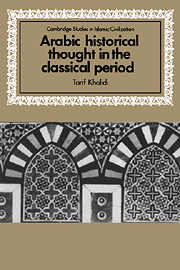Conclusion
Published online by Cambridge University Press: 23 November 2009
Summary
In a striking passage, Paul Veyne commends the following methodology to a historian of historiography:
So a history of historiography that wanted to get to the heart of the subject would be less concerned with the facile study of the ideas of each historian and more with an inventory of his palette.
(Writing History, p. 215)One might wonder to begin with why an inventory of a palette is a task more difficult to accomplish than a report of a processional of great minds. But I suspect that Paul Veyne does not really mean an inventory; rather, a stock-taking of a particular intellectual environment. This has in fact been the central concern of my study of Arabic historical thought. This study was premised on the view that the effect of Islamic revelation on historical thought was preponderant, that the Arabs acquired, with Islam, a new historiography as well as a new religion. It goes on to argue that historical writing began soon after the early conquests, probably in response to the drama of events, but no doubt also in response to early state-formation and the need for a legitimating, precedent-creating past. It further assumes that historical writing in all cultures and times has been peculiarly susceptible to surrounding climates of ideas and beliefs. It postulates that Arabic historical thought and writing gradually underwent the influence of four dominant epistemic ‘domes’: (1) Hadith or the sacred ‘traditions’ (2) Adab, or Belles-Lettres, (3) Hikma or the natural and social sciences and (4) Siyasa, or political theory and practice.
- Type
- Chapter
- Information
- Arabic Historical Thought in the Classical Period , pp. 232 - 234Publisher: Cambridge University PressPrint publication year: 1994



